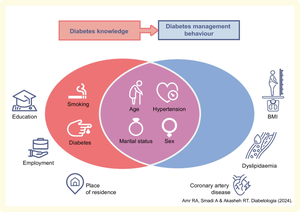Diabetologia ( IF 8.4 ) Pub Date : 2024-11-07 , DOI: 10.1007/s00125-024-06304-3 Rula A. Amr, Ahmed M. Al-Smadi, Rand T. Akasheh

|
Aims/hypothesis
Diabetes mellitus is a significant global health concern that is projected to affect 7.7% of the global population by 2030. Understanding factors that influence diabetes knowledge and management adherence is crucial for effective diabetes mellitus management and prevention. This study investigates the relationships between demographic and clinical factors and their impact on diabetes knowledge and behaviour, as well as the potential influence of diabetes knowledge on management behaviours.
Methods
The study comprised a cross-sectional survey of 1050 adults, collecting data on age, sex, marital status, education, employment, hypertension, dyslipidaemia (any lipid imbalance, such as high cholesterol, high LDL-cholesterol or low HDL-cholesterol), smoking and diabetes status. Two multiple linear regression models were used to identify factors associated with diabetes knowledge and behaviour, and a simple linear regression model was used to assess the relationship between knowledge and behaviour.
Results
Significant associations were found between diabetes knowledge and the following factors: age (44.32 ± 9.53 for ≥50 years vs 39.73 ± 9.95 for 18 to <25 years; p<0.0001), sex (49.00 ± 12.35 for women vs 45.09 ± 13.27 for men; p<0.0001), marital status (50.92 ± 11.69 for married vs 45.39 ± 13.10 for single; p<0.0001), smoking status (45.78 ± 13.22 for smokers vs 48.22 ± 12.15 for non-smokers; p=0.003), hypertension (46.46 ± 13.11 for present vs 47.31 ± 12.87 for absent; p=0.007) and diabetes status (69.49 ± 17.35 for present vs 62.76 ± 16.88 for absent; p<0.001). Behaviour scores correlated similarly with these factors except for diabetes and smoking status. The adjusted simple linear regression model revealed that diabetes knowledge was significantly associated with better management behaviours (coefficient=0.0794, p<0.001) after adjusting for demographic and clinical factors.
Conclusions/interpretation
This study highlights the importance of demographic and clinical factors in the context of diabetes knowledge and behaviours, underscoring the need for targeted educational and preventive programmes to improve diabetes management, especially in vulnerable populations. Additionally, the strong association between diabetes knowledge and management behaviours supports a knowledge–attitude–behaviour (KAB) model of diabetes management.
Graphical Abstract
中文翻译:

糖尿病知识和行为:约旦成年人的横断面研究
目标/假设
糖尿病是一个重要的全球健康问题,预计到 2030 年将影响全球 7.7% 的人口。了解影响糖尿病知识和管理依从性的因素对于有效的糖尿病管理和预防至关重要。本研究调查了人口统计学和临床因素之间的关系及其对糖尿病知识和行为的影响,以及糖尿病知识对管理行为的潜在影响。
方法
该研究包括对 1050 名成年人的横断面调查,收集有关年龄、性别、婚姻状况、教育、就业、高血压、血脂异常(任何脂质失衡,如高胆固醇、高低密度脂蛋白胆固醇或低高密度脂蛋白胆固醇)、吸烟和糖尿病状况的数据。使用两个多元线性回归模型来确定与糖尿病知识和行为相关的因素,使用一个简单的线性回归模型来评估知识与行为之间的关系。
结果
发现糖尿病知识与以下因素之间存在显著关联: 年龄 (44.32 ± 9.53 为 ≥50 岁,而 39.73 ± 9.95 为 18 至 <25 岁;p<0.0001)、性别(女性为 49.00 ± 12.35 vs 男性为 45.09 ± 13.27;p<0.0001)、婚姻状况(已婚为 50.92 ± 11.69 vs 单身为 45.39 ± 13.10;p<0.0001)、吸烟状况(吸烟者为 45.78 ± 13.22,非吸烟者为 48.22 ± 12.15;p=0.003)、高血压 (目前为 46.46 ± 13.11 vs 缺席为 47.31 ± 12.87;p = 0.007)和糖尿病状态 (目前为 69.49 ± 17.35 vs 缺席为 62.76 ± 16.88;p<0.001)。行为评分与这些因素的相关性相似,但糖尿病和吸烟状况除外。调整后的简单线性回归模型显示,在调整人口统计学和临床因素后,糖尿病知识与更好的管理行为显著相关 (系数 = 0.0794,p<0.001)。
结论/解释
本研究强调了人口统计学和临床因素在糖尿病知识和行为方面的重要性,强调了需要有针对性的教育和预防计划来改善糖尿病管理,尤其是在弱势群体中。此外,糖尿病知识与管理行为之间的密切关联支持糖尿病管理的知识-态度-行为 (KAB) 模型。


















































 京公网安备 11010802027423号
京公网安备 11010802027423号